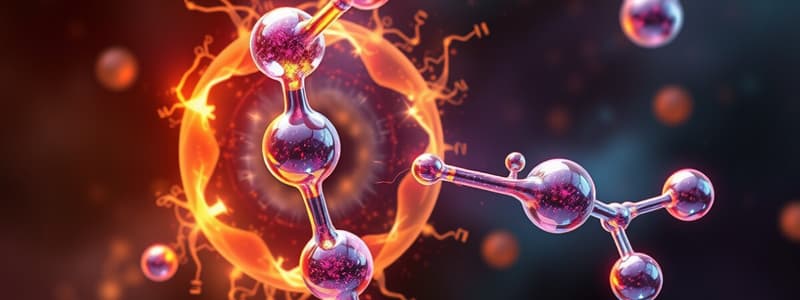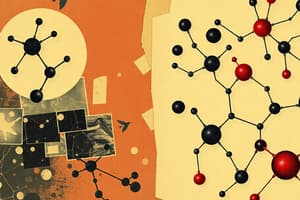Podcast
Questions and Answers
What is the definition of a molecule?
What is the definition of a molecule?
- A collection of charged ions forming a complex.
- The smallest unit of an ionic compound that retains its ionic properties.
- The smallest unit of a chemical compound that retains its chemical properties. (correct)
- Any arrangement of atoms regardless of bonding.
Which of the following statements about molecules is true?
Which of the following statements about molecules is true?
- Molecules are always charged and consist of at least three atoms.
- Molecules are made up of atoms that are only ionic bonded.
- Molecules can be composed of two or more atoms that are chemically bonded together. (correct)
- Molecules can only consist of different elements.
What distinguishes molecular compounds from ionic compounds?
What distinguishes molecular compounds from ionic compounds?
- Molecular compounds contain only two types of atoms.
- Molecular compounds are neutral, while ionic compounds consist of charged ions. (correct)
- Molecular compounds are typically gaseous at room temperature.
- Molecular compounds consist of charged ions.
Which of the following is an example of a polyatomic molecule?
Which of the following is an example of a polyatomic molecule?
What type of bonds hold the atoms within a molecule together?
What type of bonds hold the atoms within a molecule together?
Study Notes
Definition of Molecule
- A molecule is the smallest unit of a chemical compound that retains its chemical properties.
- Composed of two or more atoms that are chemically bonded together.
- Can consist of:
- Same Element: e.g., O₂ (oxygen gas), N₂ (nitrogen gas).
- Different Elements: e.g., H₂O (water), CO₂ (carbon dioxide).
Key Characteristics
- Covalent Bonds: Atoms within a molecule are held together by covalent bonds, where they share electrons.
- Molecular Formulas: Represent the number and type of atoms in a molecule (e.g., C₆H₁₂O₆ for glucose).
- Molecular vs. Ionic Compounds: Unlike ionic compounds, which consist of charged ions, molecules are neutral.
Types of Molecules
- Diatomic Molecules: Molecules composed of two atoms (e.g., H₂, Cl₂).
- Polyatomic Molecules: Molecules made up of three or more atoms (e.g., NH₃ (ammonia), CH₄ (methane)).
Importance
- Molecules are fundamental to the structure of matter and are essential in biological processes, chemical reactions, and material properties.
Definition of Molecule
- A molecule is the smallest unit of a chemical compound that maintains its chemical properties.
- It is formed by two or more atoms that are chemically bonded.
- Molecules can be composed of:
- Same Element examples: O₂ (oxygen gas), N₂ (nitrogen gas).
- Different Elements examples: H₂O (water), CO₂ (carbon dioxide).
Key Characteristics
- Covalent Bonds: Inside molecules, atoms share electrons, creating strong covalent bonds.
- Molecular Formulas: Indicate the quantity and type of atoms, such as C₆H₁₂O₆ for glucose, representing 6 carbon, 12 hydrogen, and 6 oxygen atoms.
- Neutrality of Molecules: Unlike ionic compounds made of charged ions, molecules remain electrically neutral.
Types of Molecules
- Diatomic Molecules: Composed of exactly two atoms, including H₂ (hydrogen) and Cl₂ (chlorine).
- Polyatomic Molecules: Consisting of three or more atoms, examples include NH₃ (ammonia) and CH₄ (methane).
Importance
- Molecules are vital for the structure of matter and play a crucial role in biological functions, chemical reactions, and the properties of materials.
Studying That Suits You
Use AI to generate personalized quizzes and flashcards to suit your learning preferences.
Description
This quiz explores the definition of a molecule, its key characteristics, and the different types of molecules. You will learn about covalent bonds, molecular formulas, and the distinctions between molecular and ionic compounds. Test your understanding of these fundamental concepts in chemistry!




